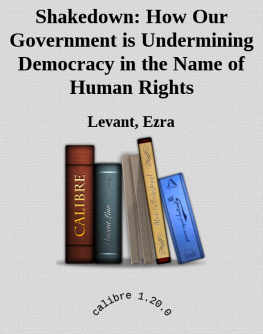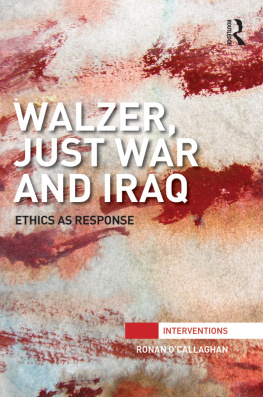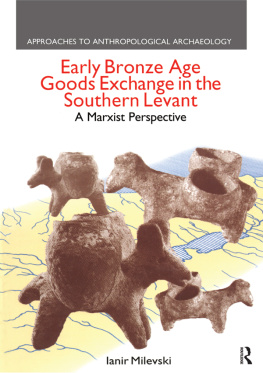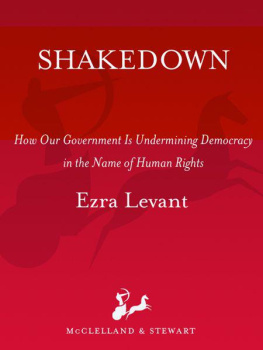Acknowledgements
Let me acknowledge the faith that Doug Pepper of McClelland & Stewart has in me. Thanks to Jenny Bradshaw for her meticulous and patient editing of the book, and to Josh Glover for spreading the word about it. And a big thank you to Kevin Libin, Canadas leading oil-sands journalist, for brainstorming to fact checking and everything in between.
ALSO BY EZRA LEVANT
Shakedown: How Our Government Is Undermining Democracy in the Name of Human Rights
Chapter 1
WHAT ARE THE OIL SANDS AND WHY ARE THEY IMPORTANT?
F or decades, the way that oil production worked is that oil was discovered in a liquid state and was pumped out of the ground just like water. It was then refined into usable products like gasoline. Thats how it still is in countries like Saudi Arabia and Iran and in the conventional oil fields of Canada and the United States. But conventional oil fields have been depleted over the years; the International Energy Agency estimated that existing, conventional oil fields are losing production at a rate of 6.7 per cent a year. With world oil prices steadily rising because of new energy demand from the emerging industrial economies in India and China, scientists have turned their attention to unconventional sources of oil like the oil sands.
The oil sands are just what they sound like: oil mixed with sand and clay. Bitumen has the thickness of peanut butter, so its not exactly ready to be pumped and piped like the Saudi stuff. The process of removing the oil from the sand in an economical way has bedevilled scientists for decades, and until recently it was considered an experimental project. Only in the past ten years have technology and higher oil prices come together to make the oil sands economically viable.
Its so unconventional that for thirty years the U.S. Securities and Exchange Commission, the government regulator that oversees the stock market, has had a policy that forbade oil companies from including oil sands oil as part of their proven reserves on their balance sheets. Thats how new oil sands oil is until recently, the world just didnt believe it could work.
But if the oil sands had a slow start, theyve made up for it with amazing growth in the past few years. More than one hundred oil companies are now working or planning to develop the oil sands, and Fort McMurray, once a sleepy outpost in Northern Alberta, has grown into the third-largest city in the province, a boom town of one hundred thousand people. It was because of the oil sands that the value of energy companies on the Toronto Stock Exchange finally exceeded the value of banks. Thats big.
The oil sands are the reason why Canada is now the number-one exporter of oil to the United States, pushing Saudi Arabia down to number two in 2004 the year the U.S. Department of Energy finally included oil sands oil in its estimates for global oil reserves. In 2008, Canada shipped 715 million barrels to the United States, far more than the 550 million barrels the Saudis sold. From 2003 to 2008, the oil sands had helped cut Saudi imports by 80 million barrels a year. The oil sands arent just a huge economic force. Theyre changing the calculus in foreign affairs and national security too.
but Albertas political and economic stability make it the most important alternative to Organization of the Petroleum Exporting Countries ( OPEC ) oil in the world. Its hard to believe, but Canadas oil sands represent more than half of all publicly accessible oil in the world that is, oil that isnt controlled by a government monopoly. Thats why companies from around the world are setting up shop in Canada. If youre an investor in oil and anyone with a pension fund probably is youre an investor in the oil sands.
But while the oil sands are an enormous economic and energy opportunity, theyre a great public relations opportunity for critics of oil too. For one thing, theyre ugly, or at least the handful of open-pit mines dating back to the first oil sands installations are, since theyre vast digging operations conducted by incredibly large shovels and trucks. Theyve been the subject of dramatic photo shoots by the likes of National Geographic magazine, and the ugliness of those mines are now a staple in fundraising letters for every environmentalist group in the world. Oil sands porn sells magazines and gets donations, but its not exactly a substitute for a serious discussion about the pros and cons of oil sands oil compared to OPEC oil.
But any industrial project brings negative side effects with its benefits. Ugly photographs are part of the story, but theyre not the whole story. Putting the oil sands into perspective means understanding not just how Alberta operates, but how the rest of the world produces oil too. And it also means getting behind some of the tactics and agendas of those who wish dearly to see the oil sands stopped and shut down tomorrow to find out whats really going on. As with any politically charged, economically transformative issue, there are hidden agendas and vested interests beneath the surface; the truth about the oil sands isnt always what it seems. A good place to start is comparing the ethics of the Canadian oil sands to other oil-producing countries countries that dont allow National Geographic or other journalists free rein to report on them or activists to protest their behaviour.
Chapter 2
THE VERY SHORT LIST OF DEMOCRACIES THAT SELL OIL
I ts a fact of life: if Americans dont fill up their cars with Canadian gasoline, their gas is going to come from another oil-producing country. Even environmentally friendly cars like the Toyota Prius still need to get their gasoline from somewhere.
The oil sands have made democratic, peaceful Canada the number-one source of U.S. oil. But the rest of Americas international oil suppliers are pretty ugly. With few exceptions, the other countries on the top ten list are the worlds dictatorships, human rights abusers, and warmongers.
After Canada, Saudi Arabia is the biggest source of U.S. oil imports. Saudi Arabia is an Islamic feudal state named after the Saud family that owns it some seven thousand princes are brutalized, and where political dissent is forbidden.
A major sponsor of world terrorism, Saudi Arabia is where Osama bin Laden made his money and its also where fifteen of the nineteen 9/11 hijackers came from. Needless to say, a country that doesnt value human life doesnt care much about plants and animals either environmentalism is the punchline to antiAmerican jokes in Saudi Arabia, not a pillar of their oil industry. This fascist theocracy shipped 551 million barrels of oil to the United States last year.
In third place is Mexico, nominally a democracy but a democracy with endemic human rights abuses and corruption. They sold 433 million barrels to the United States last year.
Venezuela, run by socialist strongman Hugo Chvez, is next, followed by corrupt Nigeria, strife-torn Iraq, undemocratic Angola, and torture-loving Algeria. The worlds nastiest regimes, like Iran and Sudan, cant legally sell oil to the United States directly because of economic sanctions. But with major oil consumers like China and Japan taking up the slack, those sanctions are essentially meaningless. Moreover, for every barrel of oil that doesnt come out of the oil sands, another barrel must come from somewhere else. The less oil that comes from Alberta, the better it is for every other exporter in the world, including Iran and Sudan.
The list of countries that export oil to the United States is a rogues gallery. But the rankings of the worlds oil reserves a good predictor of where oil is going to come from in the future is even worse. Out of the top ten countries with the largest reserves, Canada is the only liberal democracy, other than the fledgling democracy of Iraq.the conclusion that oil comes from the worlds worst places, and theres no reason to expect that to change.








